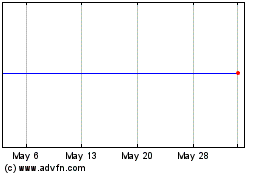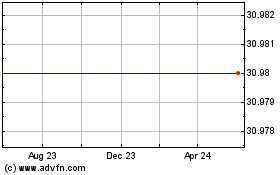Amylin, Lilly Part Ways - Analyst Blog
November 09 2011 - 7:28AM
Zacks
Amylin Pharmaceuticals, Inc. (AMLN) and
Eli Lilly and Company (LLY) recently decided to
terminate their long-standing partnership for the worldwide
development and commercialization of exenatide. The news sent
Amylin’s shares tumbling almost 11%.
Amylin and Eli Lilly’s partnership dates back to 2002 when the
companies entered into a global development and commercialization
agreement for exenatide. Exenatide is currently available under the
trade name, Byetta. It has also been developed as a once-weekly
treatment (Bydureon) of type II diabetes. While Bydureon is
available in the EU, it is yet to gain approval in the US where it
has received two complete response letters. The Food and Drug
Administration (FDA) expects to respond on Bydureon’s approvability
by Jan 28, 2012.
Cracks in the partnership emerged earlier this year when Amylin
filed a lawsuit against Eli Lilly in May 2011. Amylin claimed that
Eli Lilly was engaging in anti-competitive activities, thereby
breaching its agreement for the maximization of sales of exenatide.
Amylin’s main complaint was regarding Eli Lilly’s global alliance
with Boehringer Ingelheim for the development and commercialization
of type II diabetes product, Tradjenta (linagliptin). According to
Amylin, Tradjenta, which received FDA approval in early May, would
compete directly with the exenatide family.
The company said that the manner in which Eli Lilly intended to
implement the Tradjenta agreement showed that Eli Lilly was
behaving in an improper, unlawful and anticompetitive manner.
Amylin was looking to stop Eli Lilly from using the same sales
force for promoting both Byetta and Tradjenta.
The termination of the partnership resolves the outstanding
litigation between the companies.
Key Points of the Termination Agreement
Full responsibility for the worldwide development and
commercialization of exenatide will be transitioned to Amylin,
starting in the US on November 30, 2011. Responsibility for the
commercialization of Byetta (exenatide) injection and Bydureon in
ex-US markets will be transferred to Amylin on a market-by-market
basis in 2012 and 2013. Amylin said that it will work with Eli
Lilly on all plans for ex-US markets during the transition period
and will guarantee that Eli Lilly does not experience losses on
exenatide-related activities during that period, up to a total of
$60 million.
Amylin will make a one-time, upfront payment of $250 million to
Eli Lilly by November 22. Moreover, Amylin will pay 15% of global
sales of exenatide products (under a revenue sharing obligation) up
to $1.2 billion plus accrued interest. Amylin will issued a secured
note worth $1.2 billion to Eli Lilly and the above-mentioned
revenue sharing payments will be adjusted against the outstanding
amount of the note. These payments will commence from Nov.
2012.
However, if Bydureon (Amylin’s once-weekly version of exenatide)
fails to gain FDA approval by June 30, 2014, Amylin’s revenue
sharing obligations will terminate and it will be required to pay
Eli Lilly 8% of global net sales of exenatide products.
Meanwhile, Eli Lilly is also entitled to receive a $150 million
milestone payment on the FDA approval of a once monthly suspension
version of exenatide (currently in phase II development).
As far as the maturity date of the $165 million line of credit
drawn by Amylin from Eli Lilly earlier this year is concerned, the
same will now fall due in the second quarter of 2016 instead of the
second quarter of 2014.
The Path Forward
Amylin said that it will seek one or more partners outside the
US for exenatide. The company will also continue with the
development of Bydureon Pen and the once-monthly suspension
formulation.
Amylin continues with its pre-launch commercial activities in
anticipation of the potential approval and launch of Bydureon in
the US in 2012. The company intends to bring a new exenatide sales
force into place which will consist of 325 representatives who will
provide more first- and second-position details. The company will
continue promoting Byetta and Symlin with its existing 325-person
diabetes specialty sales force to primary-care physicians and
endocrinologists.
Financial Implications for Amylin
With the termination of the deal, Amylin’s operating expenses
will go up by $150 million to $170 million annually. Amylin expects
its pro forma cash balance to decline to about $210 million.
However, the company believes this agreement will be accretive to
its cash flow by the end of 2013.
Our Take
The termination of the agreement brings with it some pros and
cons. On the positive side, the deal provides Amylin with full
control over exenatide, which should bode well in the long-term.
Even though Amylin has a revenue sharing obligation to Eli Lilly,
it will not be required to share profits with Eli Lilly.
However, nearer term, there are some concerns. The main concern
is regarding the company’s debt situation and cash position. The
company expects a cash balance of about $210 million and has an
outstanding debt of $575 million due June 15, 2014.
With the deal, the company now has a $1.2 billion bond from Eli
Lilly which comes with an interest rate of 9.5%. Amylin is also
losing a strong marketing partner in Eli Lilly. There is also some
concern that the termination of the deal signifies Eli Lilly’s lack
of confidence in Bydureon’s US approval.
We currently have a Neutral recommendation on Amylin, which
carries a Zacks #3 Rank (short-term Hold rating). FDA approval for
Bydureon and partnership deals for ex-US markets would be a major
boost for the stock.
AMYLIN PHARMA (AMLN): Free Stock Analysis Report
LILLY ELI & CO (LLY): Free Stock Analysis Report
Zacks Investment Research
Amylin Pharmaceuticals, Inc. (MM) (NASDAQ:AMLN)
Historical Stock Chart
From Jun 2024 to Jul 2024

Amylin Pharmaceuticals, Inc. (MM) (NASDAQ:AMLN)
Historical Stock Chart
From Jul 2023 to Jul 2024
